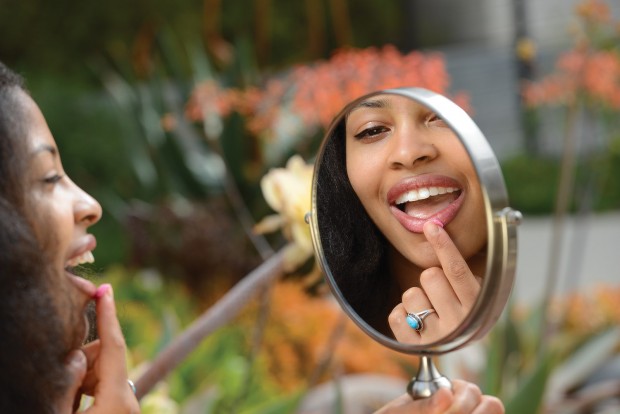
Joyce Nimocks ’15 has fond memories of her grandmother teaching her to make body butter out of olive oil and using natural, homemade concoctions on her granddaughter’s curly hair.
Nimocks’ grandmother was both creative and resourceful. Store-bought hair products were usually made for women who wore their hair straight. Mainstream cosmetics made Nimocks’ skin break out. And money was tight.
After graduating from Pomona last May with a $12,000 Napier Initiative grant in hand, Nimocks returned to her hometown of Chicago to conduct free summer workshops for low-income women of color to inform them of the ingredients in commercial cosmetics and teach them how to make their own products with natural, non-toxic ingredients.
An environmental analysis major, Nimocks wrote her thesis on the health implications of hair relaxers. Exploring the issue in depth through the Summer Undergraduate Research Program, as well as her study-abroad in Brazil, she found an extensive study showing an association between African American women who frequently used hair relaxers and the presence of uterine fibroids.
She cites research indicating that hair relaxers seep through the epidermis, making it easier for estrogen-mimicking hormones to enter the bloodstream. In addition to inducing fibroids and uterine cysts, they have been implicated in causing premature puberty in girls as young as six months old.
“What I found is that this isn’t just a public health issue; this is also a social justice issue, in my opinion, because these products are only being marketed toward women of color,” says Nimocks.
The injustice continues because all-natural products are prohibitively expensive for low-income women, she says. “You can get a bottle of a non-natural brand of lotion—32 ounces for four dollars at Walmart. You get a small 12-16 ounces of a natural brand, and it costs you seven to eight dollars,” says Nimocks.
In her workshops, she focused on teaching women how to make lipsticks on stovetops with beeswax, shea butter and crayons; body butters using a cake mixer, with aloe vera gel, cocoa butter and, of course, olive oil; and natural perfumes with witch hazel and essential oils. One of Nimocks’ favorite homemade products is her deodorant, a blend of coconut oil and baking soda, infused with lavender, orange and tea tree oils.
Nimocks herself is a powerhouse blend, according to Professor of Environmental Analysis Char Miller. “She has a compelling ability to weave together her academic interests with her activism, her professional and civic engagement,” says Miller.
Nimocks hopes to someday open a center where low-income women can come and make their own cosmetics for free, funded by workshops she’d conduct for a fee in middle-to-high-income communities.
Thanks to a six-week Social Entrepreneurship class taught through the Draper Center for Community Partnerships, Nimocks has written a business proposal to start a nonprofit. She says her summer research and classes like these have given her the confidence required to believe she can bring big ideas to life.
“It’s about beauty,” she explains. “It’s about relaxation. It’s about self-care and self-love. I can really see my organization being a place where women feel comfortable going to and even talking about community issues. I can see it being a really integral part of communities and also partnering with other community organizations, like libraries or YMCAs in Chicago.”
But before she launches into that project, she has more research to do. Funded by a prestigious $30,000 Watson Fellowship, Nimocks is currently on a tour of Ghana, Japan and South Africa to work with artisans, farmers and other groups and learn about the ways they use local ingredients to produce sustainable, handmade cosmetics.
Nimocks recalls conversations with her grandmother while making their beauty products in the kitchen. Years later, recreating relationships around all-natural cosmetics is a tribute to her heritage. “My grandmother would be really happy,” she says.
